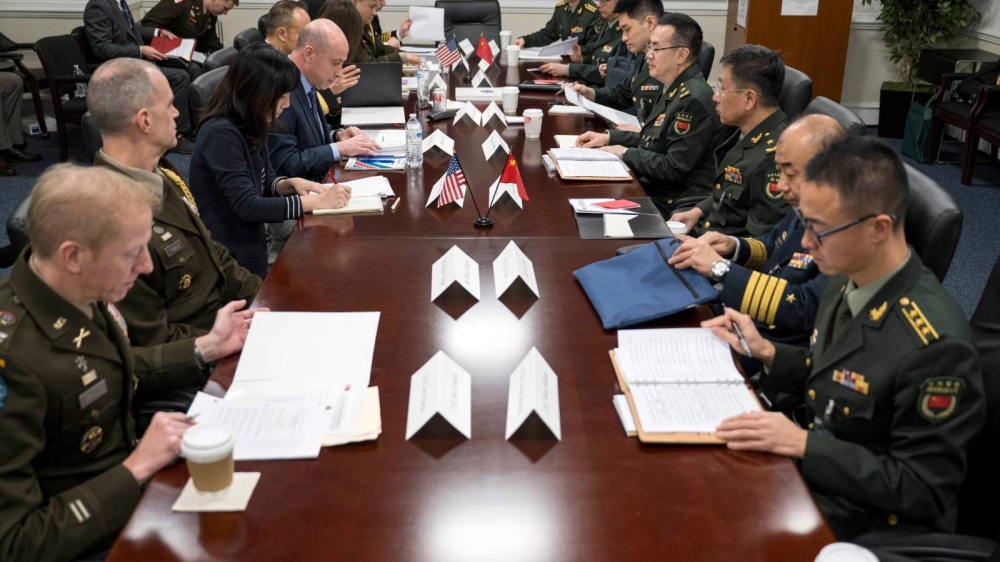
Jing Xuan Teng and Martin Abbugao The United States and China will resume military-to-military communications "in the coming months", US Defense Secretary Lloyd Austin said Friday, as Beijing hailed the "stabilising" security relations between the countries.
Austin met with his Chinese counterpart Dong Jun on the sidelines of the Shangri-La Dialogue in Singapore in the first substantive face-to-face talks between the two defence chiefs in 18 months.
Dong and Austin met for over an hour at the luxury hotel hosting the security forum that is attended by defence officials from around the world and in recent years has become a barometer of US-China relations.
Austin said telephone conversations between US and Chinese military commanders would resume "in the coming months", according to a readout released by the Pentagon.
He also welcomed plans for a "crisis-communications working group" with China by the end of the year, the statement said.
Describing the talks as "positive", Chinese defence spokesman Wu Qian told reporters that military-to-military relations were "currently stopping their decline and stabilising".
But Wu cautioned that it was not possible for Beijing and Washington to solve all bilateral problems in one meeting, highlighting their thorniest dispute over Taiwan, which China considers part of its territory.
This year's Shangri-La Dialogue comes a week after China held military drills around self-ruled Taiwan and warned of war over the US-backed island following the inauguration of President Lai Ching-te, who Beijing has described as a "dangerous separatist".
"The Taiwan issue is purely China's internal affairs, external forces have no right to interfere, and the United States' actions seriously violate the one China principle," Wu said, referring to Washington's decision to congratulate Lai and send a delegation to the ceremony.
Austin said China's military exercises were "provocative" and insisted it should not use Taipei's "political transition... as a pretext for coercive measures."
- Resuming dialogue -US President Joe Biden's administration and China have been stepping up communication to ease friction between the nuclear-armed rivals, with Secretary of State Antony Blinken visiting Beijing and Shanghai last month.
A key focus has been the resumption of military-to-military dialogue, which is seen as critical to preventing flashpoint disputes from spinning out of control.
China scrapped military communications with the United States in 2022 in response to then-US House Speaker Nancy Pelosi's visit to Taiwan.
Tensions between Washington and Beijing were further stoked by issues including an alleged Chinese spy balloon that was shot down over US airspace, a meeting between Taiwan's then-president Tsai Ing-wen and Pelosi's successor Kevin McCarthy and American military aid for Taipei.
China is also furious over the United States' deepening defence ties in the Asia-Pacific, particularly with the Philippines, and its regular deployment of warships and fighter jets in the Taiwan Strait and South China Sea.
Beijing views this as part of a decades-long US effort to contain it.
The two sides agreed after a summit between Chinese leader Xi Jinping and Biden last November to restart high-level military talks, including over military operations near Taiwan, Japan and in the South China Sea.
- Pressure points -Chinese and American forces have had a series of close encounters in the disputed waterway that China claims almost entirely.
While meeting Dong, Austin underscored the importance of "high seas freedom of navigation", especially in the South China Sea, and insisted that the United States would continue to "fly, sail and operate" wherever international law allowed, the Pentagon readout said.
Philippine President Ferdinand Marcos, who has sought to deepen defence cooperation with the United States as he stands up to Chinese actions in waters off the Southeast Asia country, will deliver the Shangri-La Dialogue's keynote speech on Friday.
Austin and Dong will also give speeches in Singapore this weekend in which they are expected to touch on a range of their nations' pressure points.
Their meeting on Friday follows a phone call between them in April, and offers hope of further military talks to cool tensions.
Austin's last significant interaction with a Chinese counterpart was in November 2022 when he met with Wei Fenghe in Cambodia.
Wei was subsequently replaced by Li Shangfu, who shook hands and spoke briefly with Austin at the Shangri-La Dialogue in 2023, but they did not hold a formal meeting.
